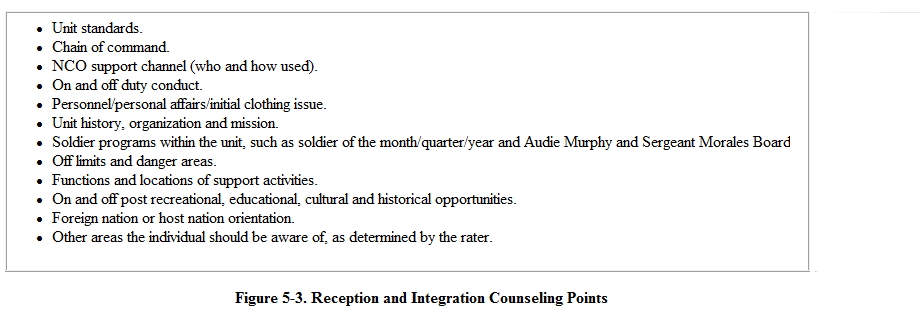COUNSELING FOR SPECIFIC INSTANCES
5-13. Sometimes counseling is tied to specific instances of superior or substandard duty performance. For example, you tell your soldier whether or not the performance met the standard and what the soldier did right or wrong. The key to successful counseling for specific performance is to conduct the counseling session as close to the time of the event as possible.
5-14. When counseling a soldier for specific performance take the following actions:
Tell the soldier the purpose of the counseling, what was expected and how they failed to meet the standard.
Address the specific unacceptable behavior or action, not the person's character.
Tell the soldier the effect of the performance on the rest of the unit.
Actively listen to the soldier's response.
Remain unemotional.
Teach the soldier how to meet the standard.
Be prepared to do some personal counseling since the lack of performance may be related to or the result of a personal problem.
Explain to the soldier what will be done to improve performance (plan of action). Identify your responsibilities in implementing the plan of action.
Continue to assess and follow-up on the soldier's progress. Adjust the plan of action as necessary.
Reception and Integration Counseling
5-15. Leaders must counsel new team members when they report in. Reception and integration counseling serves two purposes: First, it identifies and helps fix any problems or concerns that new members have, especially any issues resulting from the new duty assignment. Second, it lets them know the unit standards and how they fit into the team. Reception and integration counseling starts the team building process and lets the soldier know the leadership cares. Reception and integration counseling clarifies job titles and it sends the message that the chain of command cares. Reception and integration counseling should begin immediately upon arrival so new team members can quickly become integrated into the organization. Figure 5-3 gives some possible discussion points.

Crisis Counseling
5-16. You may conduct crisis counseling to get a soldier through the initial shock after receiving negative news, such as notification of the death of a loved one. You help the soldier by listening and providing assistance, as appropriate. Assistance may include referring the soldier to a support activity or coordinating external agency support. Crisis counseling focuses on the soldier's immediate, short-term needs.
Referral Counseling
5-17. Referral counseling helps soldiers work through a personal situation and may follow crisis counseling. Referral counseling also acts as preventative counseling before the situation becomes a problem. Usually, the leader assists the soldier in identifying the problem.
5-18. Outside agencies can help leaders resolve problems. Although it is generally in an individual's best interest to seek help first from his first line leader, leaders must always respect an individual's right to contact these agencies on their own. Leaders can refer the soldier to the appropriate resource, such as Army Community Services, a Chaplain, or a substance abuse counselor. Additional information on support activities can be found in Appendix B, Army Programs or in FM 6-22 (22-100), Appendix C.
Helping soldiers cope with personal problems means more than referring the soldier to another person- the chaplain, a doctor, or counselor. Until the problem is resolved, you have a soldier with a problem in your unit, so it's your problem. Let your soldiers know what you're doing to help them solve their problems.
FM 22-600-20, The Army Noncommissioned Officer Guide, 1980
Promotion Counseling
5-19. Commanders or their designated representatives must conduct promotion counseling for all specialists, corporals and sergeants who are eligible for advancement without waiver, but are not recommended for promotion to the next higher grade. Army regulations require that soldiers within this category receive initial (event-oriented) counseling when they attain full eligibility and then periodic (performance and personal growth) counseling at least quarterly.
Adverse Separation Counseling
5-20. Adverse separation counseling may involve informing the soldier of the administrative actions available to the commander in the event substandard performance continues and of the consequences associated with those administrative actions. (See AR 635-200, Chapter 1, paragraph 1-16 and Chapter 17.)
5-21. Developmental counseling may not apply when a soldier has engaged in more serious acts of misconduct. In those situations, the leader should refer the matter to the commander and the servicing staff judge advocate's office. When the leader's rehabilitative efforts fail, counseling with a view towards separation fills an administrative prerequisite to many administrative discharges and serves as a final warning to the soldier to improve performance or face discharge. In many cases, it may be beneficial to involve the chain of command as soon as you determine that adverse separation counseling might be required. The first sergeant or commander should inform the soldier of the notification requirements outlined in AR 635-200.


